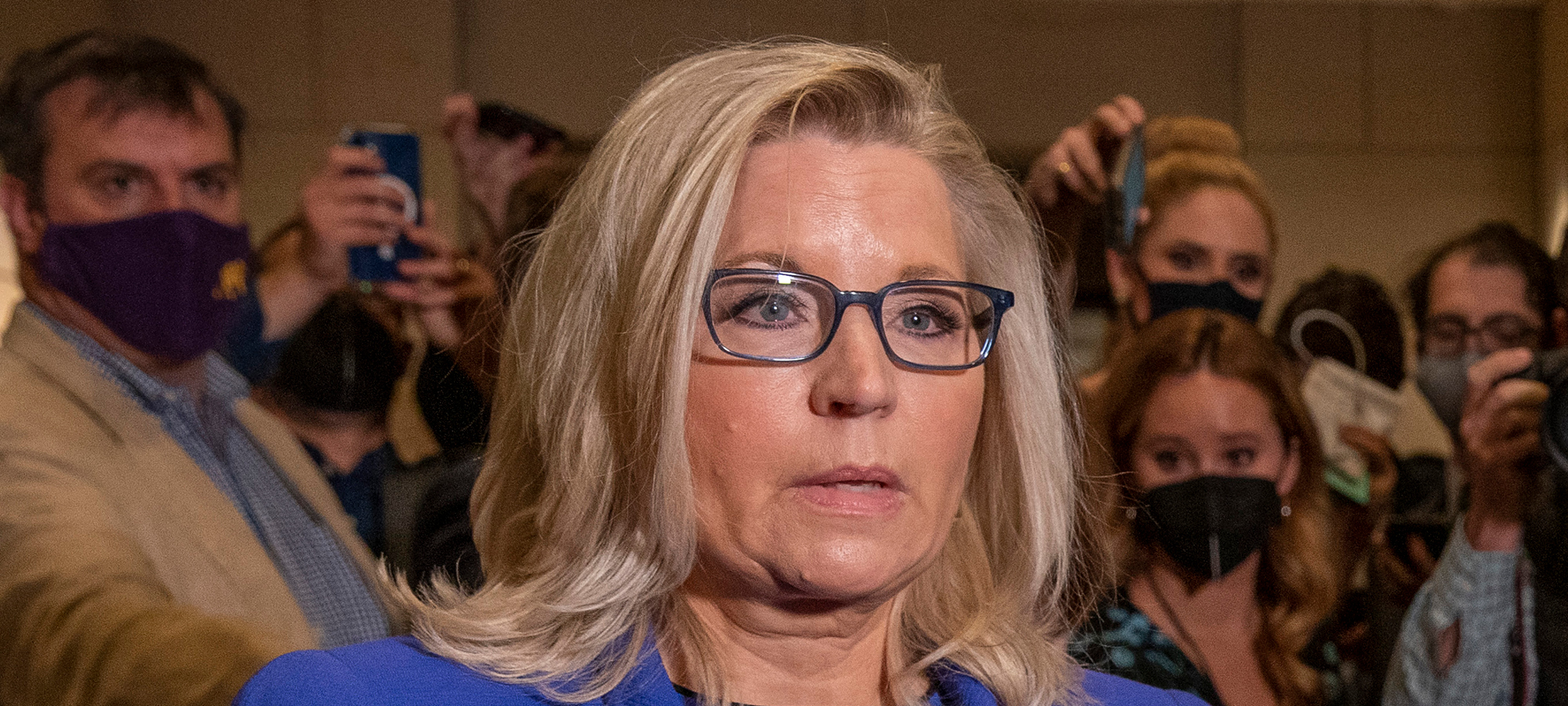
Rep. Liz Cheney, JD’96, addresses the media after being removed from her role as House Republican conference chair. (Tasos Katopodis/UPI/Newscom)
Still speaking out against “the big lie,” Liz Cheney, JD’96, makes an Alumni Weekend appearance.
On January 12, US representative Liz Cheney (R-WY) released a statement announcing she would vote to impeach President Donald J. Trump for provoking the incursion on the Capitol six days earlier. “The President of the United States,” Cheney said, “summoned this mob, assembled the mob, and lit the flame of this attack.” She was one of 10 House members in her party to vote to impeach, while 197 voted against it. Four months later, her criticisms of Trump still loud and clear, Cheney’s fellow Republicans removed her as conference chair.
“Your rise in the House was very, very swift, to the number three position in the House,” Institute of Politics director and former Democratic strategist David Axelrod, AB’76, said to Cheney in front of a virtual audience of UChicago alumni this past June. “Your release from that position was just as swift.”
Their conversation headlined this year’s Alumni Weekend @ Home, along with appearances by incoming UChicago president Paul Alivisatos, AB’81, and Impossible Foods founder Pat Brown, AB’76, PhD’80, MD’82.
During Trump’s time in office, Cheney, JD’96, overwhelmingly lined up with the former president on the issues—voting in support of his positions almost 93 percent of the time. At the Alumni Weekend event, Cheney drew a bright line between policy matters and Trump’s actions following the 2020 presidential election.
“From a policy perspective you can go back and say, here’s where we agreed and here’s where we disagreed,” she said. “Once you get into the fundamental attacks on the electoral process, and then what happened on January 6, that’s nothing to do with policy.”
Cheney, whose father is former vice president Dick Cheney, came to the University of Chicago Law School in 1993, after twice deferring to stay on at her job with the US Agency for International Development (USAID). It was the immediate aftermath of the Berlin Wall’s fall, and her bureau’s focus on supporting democracy and market economies in countries formerly behind the Iron Curtain or in the Soviet Union felt especially critical. Cheney practiced international law and worked on Middle East policy at the State Department during George W. Bush’s administration in the two decades between her graduation and her first election to the House in 2016.
The state that elected her, Wyoming, is “a very conservative state. I’m a conservative Republican,” Cheney noted at the Alumni Weekend event. That aligned her with Trump on issues like business deregulation, tax cuts, and resources for national defense. “But we are also a state that reveres the Constitution,” she stressed, “and understands and reveres the important role of the oath that we all take, those of us who are serving in elected office.”
For Cheney, Trump’s behavior after November 3 was “the most egregious violation of an oath of office of any president in our history”—and pretending otherwise would violate her own oath. “He exercised his legitimate rights through the court system,” she told Axelrod. “That was legitimate and he had the right to do that.” In her view, his subsequent attempts to pressure state and local officials amounted to trying to steal an election, as did the call for his followers to come to Washington, DC, on January 6 and the suggestion they could change the election outcome.
When House minority leader Kevin McCarthy (R-CA) and other elected Republicans shifted from denouncing Trump’s role in the events of that day to minimizing or denying it, Cheney continued to speak out. “It became clear,” she said at the Alumni Weekend event, “that to stay in leadership I would have to be willing to perpetuate the lie. And I wasn’t willing to do that.” After the party rescinded her leadership position in May, she reaffirmed her view of Trump’s actions and told reporters she would “do everything I can to ensure that the former president never again gets anywhere near the Oval Office.”
Now she faces a reelection campaign in heavily pro-Trump Wyoming in 2022. Cheney and Axelrod agreed that it will be a tough race, with Trump certain to use his bully pulpit against her. But, “inspired and heartened” by recent conversations with constituents, she thinks she’ll prevail.
She thinks, too, that her race will determine far more than her own future. “Assuming Donald Trump endorses somebody, which I assume he will,” she said, “it will be a choice for the voters of Wyoming.” They’ll choose “between a candidate who’s pledged loyalty to Donald Trump—loyalty to one man—and me, who has demonstrated loyalty to the people of Wyoming, loyalty to the Constitution above all.” That will amount to “a very clear message to the rest of the country about where the Republican Party is.”
Listen to the whole conversation on David Axelrod’s podcast, The Axe Files, produced by the IOP and CNN.
